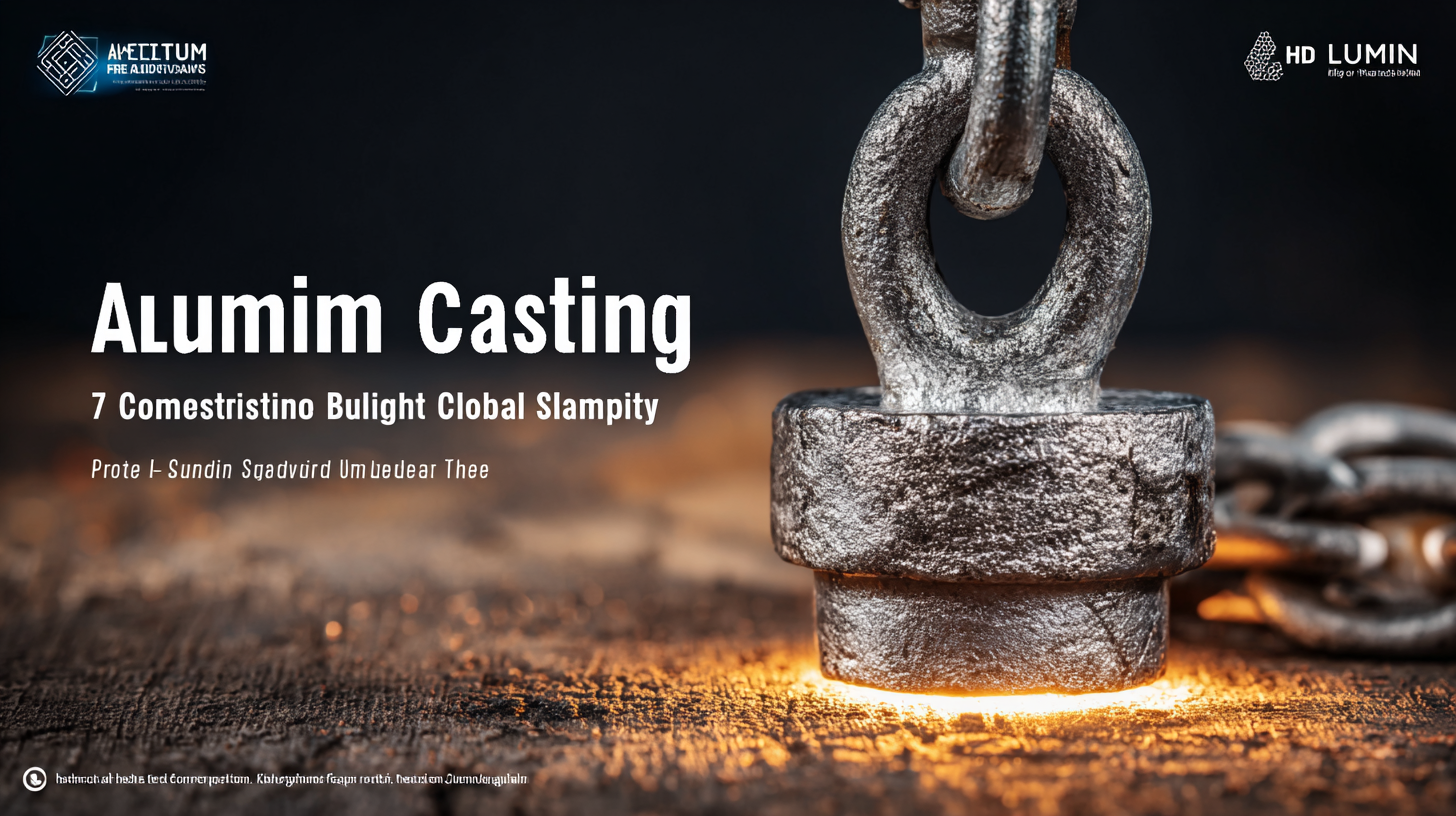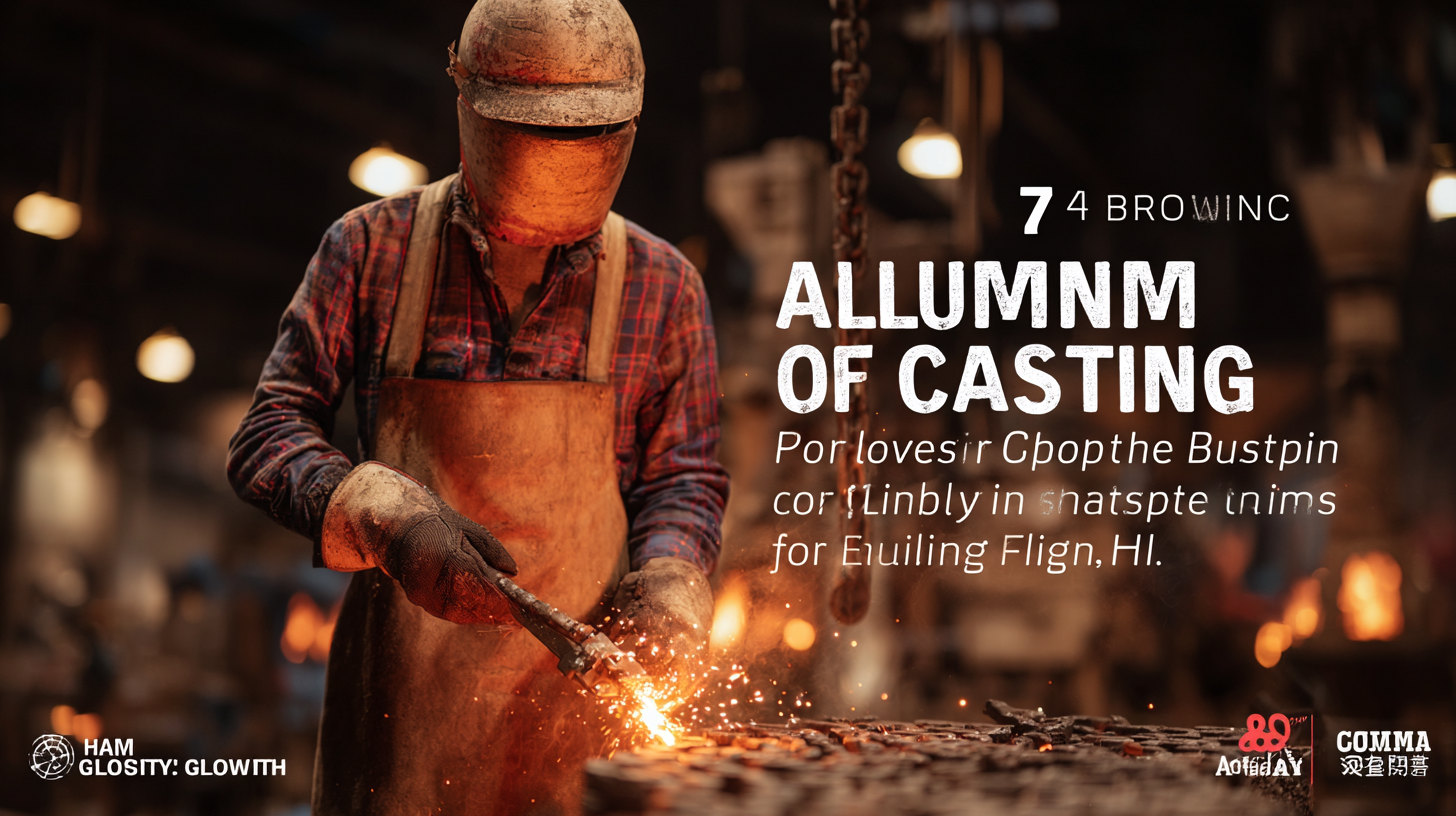

In today's competitive manufacturing landscape, the choice of materials plays a crucial role in optimizing global supply chains. One material that stands out for its versatility and efficiency is Aluminum Casting. According to a recent report by Grand View Research, the global aluminum casting market was valued at approximately $28.5 billion in 2021 and is expected to expand at a compound annual growth rate (CAGR) of 4.8% through 2028. This surge in demand is driven by the increasing need for lightweight, durable components in industries ranging from automotive to aerospace. As companies strive to enhance their operational efficiency and reduce costs, selecting high-quality aluminum casting not only ensures superior performance but also supports sustainability initiatives. By embracing the advanced capabilities of aluminum casting, businesses can significantly improve their supply chain resilience and adaptability, thereby positioning themselves for future growth and innovation.

The importance of quality aluminum casting in global supply chains cannot be overstated, especially given the projected growth of the die casting market, which is anticipated to reach USD 112.14 billion by 2029. This growth highlights a significant shift towards high-quality materials and processes that enhance efficiency and reliability within supply chains. Quality aluminum casting ensures that components meet exacting standards, which is crucial for industries relying on precision, such as automotive and aerospace.
As companies face increasing pressure to diversify their supply chains due to changing regulations like the US Inflation Reduction Act, investing in the best aluminum casting becomes essential. It not only optimizes production but also mitigates risks associated with supply chain disruptions. With the aluminum die casting market expected to expand by USD 46.2 billion from 2024 to 2028, driven largely by demand in the automotive sector, manufacturers need to prioritize quality in their sourcing decisions.
**Tips**: Ensure that your suppliers are certified and have a track record of delivering quality products. Regularly review market trends and forecasts to stay ahead of potential disruptions. Investing in quality now can yield significant long-term savings by reducing waste and improving product performance.
As industries worldwide move towards more sustainable practices, the role of lightweight materials like aluminum has become increasingly crucial. The aluminum industry is one of the key foundational industries globally, driving economic growth and job creation. According to the 2023 Aluminum Industry Research Report, the necessity for lightweight components in automotive manufacturing has surged, driven by stringent environmental policies aimed at reducing carbon emissions. This trend emphasizes the importance of integrating aluminum casting methods to optimize supply chains and exploit the lightweight advantages these materials offer.
The implementation of aluminum components not only enhances the efficiency of manufacturing processes but also significantly contributes to energy savings and emission reductions. For instance, as highlighted in recent reports, the penetration rate of lightweight materials in the automotive sector is on the rise, largely due to the industry's push for carbon neutrality and green transformation. Aluminum die casting is recognized for its numerous benefits, including improved production speed and reduced material waste, making it a valuable solution for manufacturers looking to innovate while maintaining sustainability.

Aluminum casting has emerged as a frontrunner in cost-effective production processes, particularly for companies looking to optimize their global supply chain. According to a report by the Aluminum Association, aluminum casting processes can reduce manufacturing costs by up to 30% compared to traditional methods. This significant cost reduction is largely due to aluminum's lightweight properties, which allow for lower shipping costs and enhanced fuel efficiency in transportation. Furthermore, the rapid production capabilities of aluminum casting mean that companies can respond more quickly to market demands, minimizing delays and associated costs.
In addition to reducing initial manufacturing expenses, aluminum casting is highly flexible in design and production techniques. A study from the American Foundry Society indicates that utilizing aluminum casting can lead to a 25% decrease in material waste. This not only contributes to lower overall production costs but also aligns with growing sustainability practices in supply chain management. As businesses increasingly seek to enhance their profitability while adhering to environmental standards, the cost-effectiveness of aluminum casting becomes a compelling advantage in today’s competitive landscape.
The transition to sustainable aluminum production is gaining momentum, highlighted by Australia’s $2 billion Green Aluminium Initiative, which aims to revolutionize the sector by harnessing renewable energy sources. This initiative not only aims to make aluminum production carbon neutral but also positions aluminum as a key player in the shift towards a less carbon-intensive economy. The sustainability benefits are evident, as aluminum’s lightweight properties contribute significantly to fuel efficiency in transportation. Research indicates that vehicle lightweighting through aluminum can lead to a reduction in greenhouse gas emissions, showcasing aluminum’s role as a catalyst for sustainable practices.
The global aluminum can market is projected to reach USD 94.5 billion, driven by the rising demand for eco-friendly packaging solutions. This boom in the aluminum can sector highlights a broader trend towards sustainability, as consumers increasingly favor products that minimize environmental impact. Furthermore, advancements in aluminum recycling processes are pivotal, with studies showing that recycling rates between 40% and 50% can greatly reduce resource consumption. As initiatives and technologies improve, the aluminum industry’s commitment to sustainability will not only reinforce its economic viability but also contribute significantly to the global aim of a greener future.
| Benefit | Description | Sustainability Impact |
|---|---|---|
| Lightweight | Aluminum castings are significantly lighter than steel or iron, reducing transportation costs. | Lower fuel consumption leads to reduced greenhouse gas emissions. |
| Corrosion Resistance | Aluminum naturally forms a protective oxide layer, enhancing durability. | Increased longevity reduces the need for replacements, conserving resources. |
| Recyclability | Aluminum is 100% recyclable without loss of quality. | Promotes a circular economy, reducing the demand for new raw materials. |
| Energy Efficiency | Manufacturing processes for aluminum castings can be more energy-efficient than other metals. | Lower energy consumption reduces overall carbon footprint. |
| Versatility | Aluminum can be used for a wide range of applications due to its malleability and strength. | Facilitates innovative designs that can lead to less material waste. |
| Cost-effectiveness | Reduces total lifecycle costs due to durability and low maintenance. | Encourages sustainable spending practices. |
| Thermal Conductivity | Excellent thermal conductivity makes aluminum ideal for heat exchangers. | Improves energy efficiency in product designs. |
Innovative design flexibility is a cornerstone of modern manufacturing, and
advanced aluminum casting techniques are leading the charge
in this domain. By leveraging the unique properties of aluminum, manufacturers can create
intricate shapes and specifications that were once thought impossible. The fluidity of molten
aluminum allows for intricate designs that reduce the need for assembly, streamline production
processes, and ultimately drive down costs.
This adaptability enables companies to respond faster to market demands and innovate
without the constraints often imposed by traditional manufacturing methods.
Furthermore, the lightweight nature of aluminum is complemented by its excellent
strength-to-weight ratio,
allowing for the production of components that not only meet but exceed durability standards.
Advanced casting methods such as die casting and sand casting provide manufacturers with diverse
options to achieve desired outcomes, whether it be in aerodynamics for the automotive sector or
enhanced thermal conductivity for electronic components.
This level of design flexibility gives businesses the competitive edge needed in today's fast-paced global supply chains, enabling them to thrive by customizing products for specialized applications while maintaining efficient production workflows.
